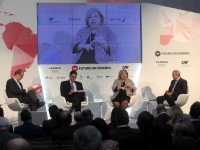Business
Internationalization is key to the future of the agri-food sector
Conference Future in Spanish
The second day of the V Conference 'Future in Spanish' held in Logrono on Friday addressed the relationship between language and business, from cooperatives to multinationals. The vice president of the Committee on Agriculture and Rural Development of the European Parliament, Eugenia Clara Aguilera, recalled that "since the 90s have experienced a large concentration in the distribution sector" that does not correspond to the development experienced by the production. "The production sector is also concentrated," said the Spanish MEP, "but he does so."
For the main specialist Inclusion in Agriculture and Rural Areas of the Ibero-American Institute for Cooperation on Agriculture (IICA) Byron Miranda, Latin America now has the "opportunity to make a bigger jump than it has been until now" after the internationalization of its products. According to Miranda, "Latin America is one of the most exclusive areas of the world" and thus work "for the integration of the territories where agricultural and non-agricultural countries are integrated".
In the conquest of this objective play an important role cooperatives. The cooperative represents in some countries more than 50% of the market share, recalled Eugenia Clara Aguilera. In Spain, it is representing between 30 and 40% of that quota. "The market share is growing," said the MEP, but warned that focuses on eight sectors. Europe lacks a law on cooperatives because competition on the state sector have in the States and, in some cases as Spain, shared with the regions.
In this country there are about 3,900 agri-cooperatives. "The cooperative model is alive," said Angel Villafranca, president of Agrifood Cooperatives of Spain, "but can not turn our backs on globalization." In his opinion, "we must not lose sight of international markets. We produce food, but produce food for the world." In the same vein Carlos Cabanas, Secretary General of Agriculture and Food of the Government of Spain, said: "The Spanish agri-food sector has a clear international vocation, but we must seize the opportunities before us."
Among others, the most important right now is the Free Trade Agreement (TTIP) being negotiated between the European Union and the United States. But all is not easy. According to the president of the Association of Young Farmers of Spain (Asaja its acronym in Spanish), Pedro Barato, "Europe in its decisions, it is very sick". In his opinion, "we must do something because it costs a lot to the decisions of the European Commission are implemented in the states."
The second day of the forum 'Future in Spanish', organized by the foundation of the media group Vocento and the Development Bank of Latin America (CAF), and dedicated in its fifth edition on 'A dialogue between Spain and Latin America', focused on the economy and the influence that language has on businesses, particularly in agri-food markets. The conference was attended by representatives of international institutions such as IICA and the European Parliament, financial institutions such as CAF and the Spanish bank Bankia, business and the world of communication.
Liability for this article lies with the author, who also holds the copyright. Editorial content from USPA may be quoted on other websites as long as the quote comprises no more than 5% of the entire text, is marked as such and the source is named (via hyperlink).






